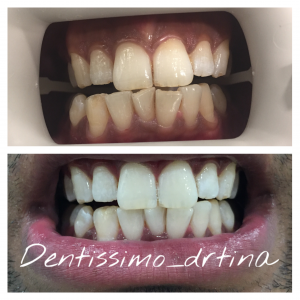Whiter teeth are a sign of good personal and oral hygiene. Whether you are getting married or attending a big event, or just want to get that more confident and brighter smile in your photos and selfies, white teeth will never go out of style. If you don’t think your teeth are as shiny as they should be, nothing works better than a professional teeth whitening without costing you a fortune. Dr. Tina Chhatpar lists a few frequently asked questions about teeth whitening or bleaching.
1) How does it work?
Ans: Teeth Whitening is a simple process, whitening products contain one of the two teeth bleaching agents namely hydrogen peroxide or carbamide peroxide. These break the stains into small pieces, which make the colour less concentrated and your teeth brighter.
2) Am I a candidate for teeth whitening? Does it work on all teeth?
Ans: You are a candidate for teeth whitening if you have yellow teeth with stains, if You are a habitual smoker, or if your teeth have gone from white to not so bright with age. Yes, teeth whitening works on healthy teeth; the only barrier being that teeth whitening does not work on teeth that have fillings, veneers or crowns or teeth with severe wear patterns. Our dentist can check your teeth and decide whether your teeth are for whitening or not.
Teeth whitening is not recommended for pregnant or lactating mothers and children under the age of 16 years.
3) What are the different types of teeth whitening and which one is suitable for me?
Ans: If you are a candidate for whitening then there are few options: -
a) In-office bleaching:- This whitening procedure is called chair-side bleaching and usually requires only one office visit. The dentist will apply either protective gel to your gums or rubber shield to protect your gums. Bleach is then applied to teeth. A special light or laser might be used to enhance the action of the whitening agent.
b) At-home bleaching: – The dentist will take an impression of your teeth and make customized trays. The bleach comes in gel form which can be placed in the tray that fits your teeth. The concentration of the bleach is lower in this case than the in-office bleach.
Our dental professionals will be able to tell which one is the most suitable for your needs.
4) Can I use whitening strips? If not, why?
Ans: There are numerous patients who buy the over-the-counter whitening strip available in the market. Although there are some disadvantages to this, the whitening strips are not FDA approved, secondly they are like plastic strips on which the whitening gel is put because you will do yourself there are chances of patchy teeth which means if the strip doesn’t seat properly it will whiten certain areas and leave out the rest. Also if you exceed the amount of time then you can experience sores or teeth sensitivity.
5) How long does the whitening last for? Will it go back to yellow again?
Ans: Generally speaking, the in-office teeth whitening works for about 2-5 years if maintained well.
Over time the teeth can go from white to not so bright with a lot of tea, coffee, cigarette, tobacco, medications, red wine resulting in change of its colour.
6) I am getting married. Is it right to go for whitening of teeth two days before the wedding?
Ans: You can whiten your teeth 10-20 days before your wedding ideally. Although there is no side-effect of whitening, but because you have so many things going on while planning for the big day, it is ideally better to keep a safe window of minimum 10 days from the date of your wedding. The other reason is that once your whitening procedure is over, your teeth will naturally absorb the sunlight and the whitening effect tend to increase with 24 to 48 hours of sunlight exposure.
7) Can I use whitening toothpaste instead?
Ans: Whitening toothpastes have abrasive particles which remove the surface stains by abrasive actions, but they do not actually whiten the teeth. Hence using whitening toothpaste is not recommended since it may remove the surface enamel causing sensitivity in the near future.
8) Is it safe for my teeth?
Ans: If done correctly by a dental professional teeth whitening is absolutely safe, some people experience temporary sensitivity of teeth which last for a maximum one day. This happens when the hydrogen peroxide in the whiten gets through the enamel to the dentin and irritates the nerve.
9) Side effects of teeth whitening?
Ans: Improper and over use of at-home whitening can damage the gums and teeth enamel, so be sure to ask your doctor.
10) Is there any teeth whitening aftercare required?
Ans: We generally advise our patients to be on a white diet immediately after the whitening procedure for about 2 days. This is because immediately after the procedure, your teeth are more susceptible to colour and stains from food, just like a white t-shirt. Some of the white things that can be included in the diet are egg-whites, pancakes, curd rice, dosa, idli, pasta in white sauce, etc. Anything that can stain your white t-shirt for example berries, cola, tea, coffee, wine, sauces, gravy, spices should be avoided for a minimum of 48 hours. This helps in retaining the whitening effect for a longer period of time.

